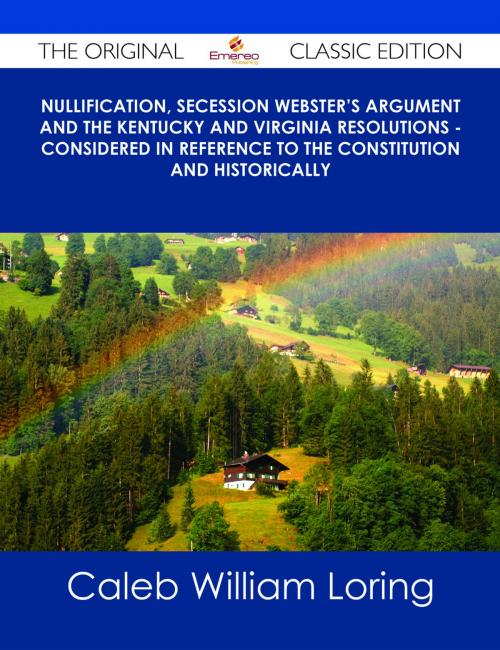Nullification, Secession Webster's Argument and the Kentucky and Virginia Resolutions - Considered in Reference to the Constitution and Historically - The Original Classic Edition
Nonfiction, Reference & Language, Reference, Fiction & Literature| Author: | Caleb William Loring | ISBN: | 9781486494941 |
| Publisher: | Emereo Publishing | Publication: | March 13, 2013 |
| Imprint: | Emereo Publishing | Language: | English |
| Author: | Caleb William Loring |
| ISBN: | 9781486494941 |
| Publisher: | Emereo Publishing |
| Publication: | March 13, 2013 |
| Imprint: | Emereo Publishing |
| Language: | English |
Finally available, a high quality book of the original classic edition of Nullification, Secession Webster's Argument and the Kentucky and Virginia Resolutions - Considered in Reference to the Constitution and Historically. It was previously published by other bona fide publishers, and is now, after many years, back in print.
This is a new and freshly published edition of this culturally important work by Caleb William Loring, which is now, at last, again available to you.
Get the PDF and EPUB NOW as well. Included in your purchase you have Nullification, Secession Webster's Argument and the Kentucky and Virginia Resolutions - Considered in Reference to the Constitution and Historically in EPUB AND PDF format to read on any tablet, eReader, desktop, laptop or smartphone simultaneous - Get it NOW.
Enjoy this classic work today. These selected paragraphs distill the contents and give you a quick look inside Nullification, Secession Webster's Argument and the Kentucky and Virginia Resolutions - Considered in Reference to the Constitution and Historically:
Look inside the book:
The United States adopted as the title—Resolutions passed that there should be two branches of the legislature, the first to be chosen by the people—Long controversy as to representation in Senate, settled by an equal representation of the States, the vote to be per capita—This compromise of representation in Senate does not affect the supremacy of the granted powers—Resolution of Elbridge Gerry referring the plan of a national government to the committee of detail unanimously passed—Government called national in many of the referred votes—Committee of detail report votes passed; the preamble declaring the government to be for posterity—Article against treason again debated and passedix unanimously—Constitution committed to committee of style and arrangement—New draft considered at length, adopted, and signed by delegates—Diversity of opinion as to durability, no suggestion that a State had a right to leave the Union—Yates and Lansing left convention because the Constitution made a national government—Satisfaction with it of Southern States—Washington’s service—Franklin’s happy speech at close—George Mason did not sign, though efficient in making it—Constitution submitted by State legislatures in each State to a convention of the people—Its acceptance considered in long sessions of the conventions held in the several States—Everywhere announced as a national government—Ratified as national in Massachusetts and Virginia—Unanimous opinion of convention of New York of its perpetuity—Amendments of Constitution, passed to quiet apprehension as to its excessive powers—Early laws show a liberal construction of the powers of the government—The right of individuals to sue States taken away, but jurisdiction over States and disputes between States retained—Insurrection in Pennsylvania against excise law suppressed—Opinion of Washington as to power of government—Alien and sedition laws passed. ...Jefferson reputed author of Kentucky resolutions—Slight notice taken of Kentucky resolutions—Resolutions are merely the opinion of the legislature passing them—Kentucky resolutions declare the States being united by compact, each has a right to pass on the validity of the laws and doings of government made by the compact—The compact of the Constitution is to leave to the United States judiciary the determination of the validity of all laws and cases.x Right of contracting powers to compel performance by a party refusing to keep its contract—Further absurdity of Kentucky resolutions in denying the validity of all punitive laws passed by Congress except for offences mentioned in the Constitution—Virginia’s resolutions fundamentally different—Madison never sanctioned nullification—Resolutions of Virginia—They are: in case of usurpation it is the duty of the States, not a State, to interpose to redress the evil—This not an assertion that States could refuse
Finally available, a high quality book of the original classic edition of Nullification, Secession Webster's Argument and the Kentucky and Virginia Resolutions - Considered in Reference to the Constitution and Historically. It was previously published by other bona fide publishers, and is now, after many years, back in print.
This is a new and freshly published edition of this culturally important work by Caleb William Loring, which is now, at last, again available to you.
Get the PDF and EPUB NOW as well. Included in your purchase you have Nullification, Secession Webster's Argument and the Kentucky and Virginia Resolutions - Considered in Reference to the Constitution and Historically in EPUB AND PDF format to read on any tablet, eReader, desktop, laptop or smartphone simultaneous - Get it NOW.
Enjoy this classic work today. These selected paragraphs distill the contents and give you a quick look inside Nullification, Secession Webster's Argument and the Kentucky and Virginia Resolutions - Considered in Reference to the Constitution and Historically:
Look inside the book:
The United States adopted as the title—Resolutions passed that there should be two branches of the legislature, the first to be chosen by the people—Long controversy as to representation in Senate, settled by an equal representation of the States, the vote to be per capita—This compromise of representation in Senate does not affect the supremacy of the granted powers—Resolution of Elbridge Gerry referring the plan of a national government to the committee of detail unanimously passed—Government called national in many of the referred votes—Committee of detail report votes passed; the preamble declaring the government to be for posterity—Article against treason again debated and passedix unanimously—Constitution committed to committee of style and arrangement—New draft considered at length, adopted, and signed by delegates—Diversity of opinion as to durability, no suggestion that a State had a right to leave the Union—Yates and Lansing left convention because the Constitution made a national government—Satisfaction with it of Southern States—Washington’s service—Franklin’s happy speech at close—George Mason did not sign, though efficient in making it—Constitution submitted by State legislatures in each State to a convention of the people—Its acceptance considered in long sessions of the conventions held in the several States—Everywhere announced as a national government—Ratified as national in Massachusetts and Virginia—Unanimous opinion of convention of New York of its perpetuity—Amendments of Constitution, passed to quiet apprehension as to its excessive powers—Early laws show a liberal construction of the powers of the government—The right of individuals to sue States taken away, but jurisdiction over States and disputes between States retained—Insurrection in Pennsylvania against excise law suppressed—Opinion of Washington as to power of government—Alien and sedition laws passed. ...Jefferson reputed author of Kentucky resolutions—Slight notice taken of Kentucky resolutions—Resolutions are merely the opinion of the legislature passing them—Kentucky resolutions declare the States being united by compact, each has a right to pass on the validity of the laws and doings of government made by the compact—The compact of the Constitution is to leave to the United States judiciary the determination of the validity of all laws and cases.x Right of contracting powers to compel performance by a party refusing to keep its contract—Further absurdity of Kentucky resolutions in denying the validity of all punitive laws passed by Congress except for offences mentioned in the Constitution—Virginia’s resolutions fundamentally different—Madison never sanctioned nullification—Resolutions of Virginia—They are: in case of usurpation it is the duty of the States, not a State, to interpose to redress the evil—This not an assertion that States could refuse















